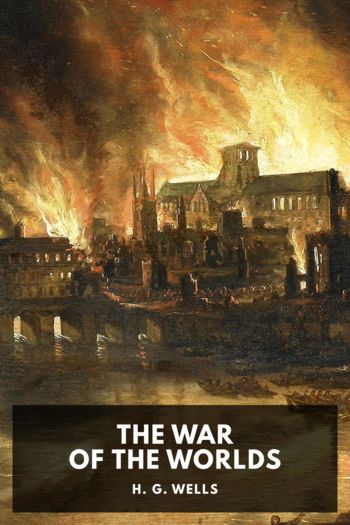The War of the Worlds - H. G. Wells (fun to read .TXT) 📗

- Author: H. G. Wells
Book online «The War of the Worlds - H. G. Wells (fun to read .TXT) 📗». Author H. G. Wells
At the corner of the bridge, too, I saw one of the common contrasts of that grotesque time—a sheet of paper flaunting against a thicket of the red weed, transfixed by a stick that kept it in place. It was the placard of the first newspaper to resume publication—the Daily Mail. I bought a copy for a blackened shilling I found in my pocket. Most of it was in blank, but the solitary compositor who did the thing had amused himself by making a grotesque scheme of advertisement stereo on the back page. The matter he printed was emotional; the news organisation had not as yet found its way back. I learned nothing fresh except that already in one week the examination of the Martian mechanisms had yielded astonishing results. Among other things, the article assured me what I did not believe at the time, that the “Secret of Flying,” was discovered. At Waterloo I found the free trains that were taking people to their homes. The first rush was already over. There were few people in the train, and I was in no mood for casual conversation. I got a compartment to myself, and sat with folded arms, looking greyly at the sunlit devastation that flowed past the windows. And just outside the terminus the train jolted over temporary rails, and on either side of the railway the houses were blackened ruins. To Clapham Junction the face of London was grimy with powder of the Black Smoke, in spite of two days of thunderstorms and rain, and at Clapham Junction the line had been wrecked again; there were hundreds of out-of-work clerks and shopmen working side by side with the customary navvies, and we were jolted over a hasty relaying.
All down the line from there the aspect of the country was gaunt and unfamiliar; Wimbledon particularly had suffered. Walton, by virtue of its unburned pine woods, seemed the least hurt of any place along the line. The Wandle, the Mole, every little stream, was a heaped mass of red weed, in appearance between butcher’s meat and pickled cabbage. The Surrey pine woods were too dry, however, for the festoons of the red climber. Beyond Wimbledon, within sight of the line, in certain nursery grounds, were the heaped masses of earth about the sixth cylinder. A number of people were standing about it, and some sappers were busy in the midst of it. Over it flaunted a Union Jack, flapping cheerfully in the morning breeze. The nursery grounds were everywhere crimson with the weed, a wide expanse of livid colour cut with purple shadows, and very painful to the eye. One’s gaze went with infinite relief from the scorched greys and sullen reds of the foreground to the blue-green softness of the eastward hills.
The line on the London side of Woking station was still undergoing repair, so I descended at Byfleet station and took the road to Maybury, past the place where I and the artilleryman had talked to the hussars, and on by the spot where the Martian had appeared to me in the thunderstorm. Here, moved by curiosity, I turned aside to find, among a tangle of red fronds, the warped and broken dog cart with the whitened bones of the horse scattered and gnawed. For a time I stood regarding these vestiges. …
Then I returned through the pine wood, neck-high with red weed here and there, to find the landlord of the Spotted Dog had already found burial, and so came home past the College Arms. A man standing at an open cottage door greeted me by name as I passed.
I looked at my house with a quick flash of hope that faded immediately. The door had been forced; it was unfast and was opening slowly as I approached.
It slammed again. The curtains of my study fluttered out of the open window from which I and the artilleryman had watched the dawn. No one had closed it since. The smashed bushes were just as I had left them nearly four weeks ago. I stumbled into the hall, and the house felt empty. The stair carpet was ruffled and discoloured where I had crouched, soaked to the skin from the thunderstorm the night of the catastrophe. Our muddy footsteps I saw still went up the stairs.
I followed them to my study, and found lying on my writing-table still, with the selenite paper weight upon it, the sheet of work I had left on the afternoon of the opening of the cylinder. For a space I stood reading over my abandoned arguments. It was a paper on the probable development of Moral Ideas with the development of the civilising process; and the last sentence was the opening of a prophecy: “In about two hundred years,” I had written, “we may expect—” The sentence ended abruptly. I remembered my inability to fix my mind that morning, scarcely a month gone by, and how I had broken off to get my Daily Chronicle from the newsboy. I remembered how I went down to the garden gate as he came along, and how I had listened to his odd story of “Men from Mars.”
I came down and went into the dining room. There were the mutton and the bread, both far gone now in decay, and a beer bottle overturned, just as I and the artilleryman had left them. My home was desolate. I perceived the folly of the faint hope I had cherished so long. And then a strange thing occurred. “It is no





Comments (0)